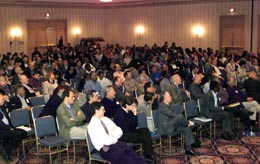 |
World Bank Rural
Week 2000 28- 31 March, Westfields Conference Center, Virginia |
<< back to main page << |
|
|
| Morning Plenary | |
| Participants kicked off the third day of Rural Week 2000 with a keynote address from Andrew Bennett, Chief Natural Resources Advisor in Department of International Development of the Development Fund for International Development (DFID), UK. Bennett gave an overview of the UK Overseas Development Institution's reorientation from aid concerns to those specifically of poverty elimination and decentralized rural livelihood strategies for the poor. | |
Part one Part two |
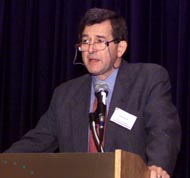 |
| A few images from the Morning Parallel Sessions: | |
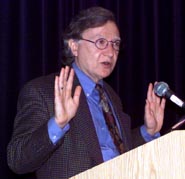 |
Session chair Anthony Pellegrini, Director Urban Development, opened the session entitled "Understanding Rural-Urban Linkages and Rural Non-Farm Economies for Growth and Poverty Alleviation". He underscored the need to distinguish the problems of urban and rural poor, and stressed that dynamics are region specific. |
| Serge Snrech, Club du Sahel/OECD described his study on the impact of transportation and access to markets on productivity and labor trends in West Africa. | 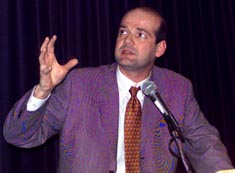 |
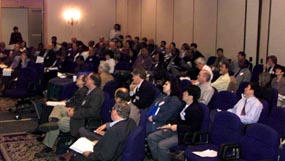 |
View of Jeffersoni I-II, where the session was held. |
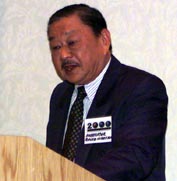 "INTEGRATED PEST MANAGEMENT: MORE PROFIT, LESS RISK": Roberto Sebastian, Former Secretary of Agriculture, Philippines, gave a keynote address about IPM as a clean, people-centered technology in the midst of rapid, misguided technological progress defiant of nature's self-limiting principles of self-adjustment, self-balance, self-regeneration and self-cleansing. He contended that IPM principles are not for national-level applications given the specificity of local contexts. As CEO of the Marsman-Dysdale Agribusiness Group, he pursued company-wide stewardship in IPM for banana, mango, okra and asparagus. He concluded that small holders and contract labor can use IPM for their own global and further attempts from Africa, Asia, Eastern Europe, Latin America, and the Middle East. |
|
| Lunch-time session | |
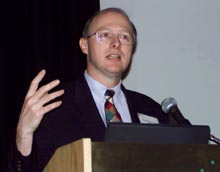 |
Christopher Gerrard (left) and John Heath (below), OEDST, presented the preliminary findings from the second phase of the evaluation of "From Vision to Action" |
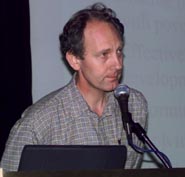 |
|
| Afternoon Plenary | |
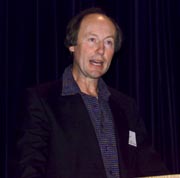 |
Chair Robert L. Thompson, Director of RDV, introduced the process of review and update of the Rural Sector Strategy - "Rural Development: from Vision to Action." - being launched during Rural Week 2000. He introduced two panel members to briefly summarize regional rural development experiences.
|
| Sushma Ganguly outlined progress in the African region. She underscored the challenge of the HIV/AIDS crisis. She highlighted multisectoral approaches and decentralization and also stressed that local capacity is necessarily multisectoral. Ganguly said that differing country situations require different strategies and traversed issues characterizing the "process client side", including the importance of strong political leadership to carry out rural development strategy. | 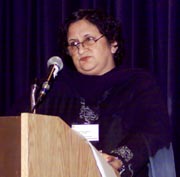 |
